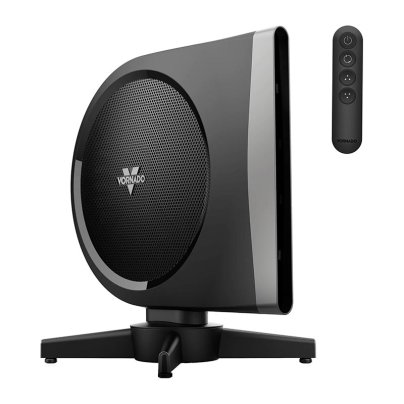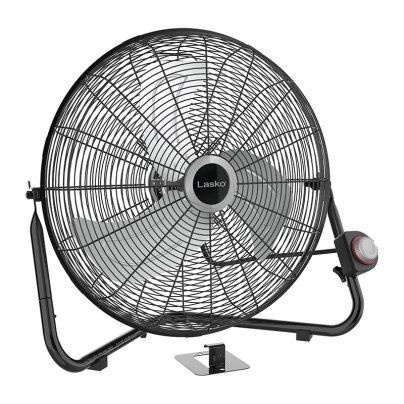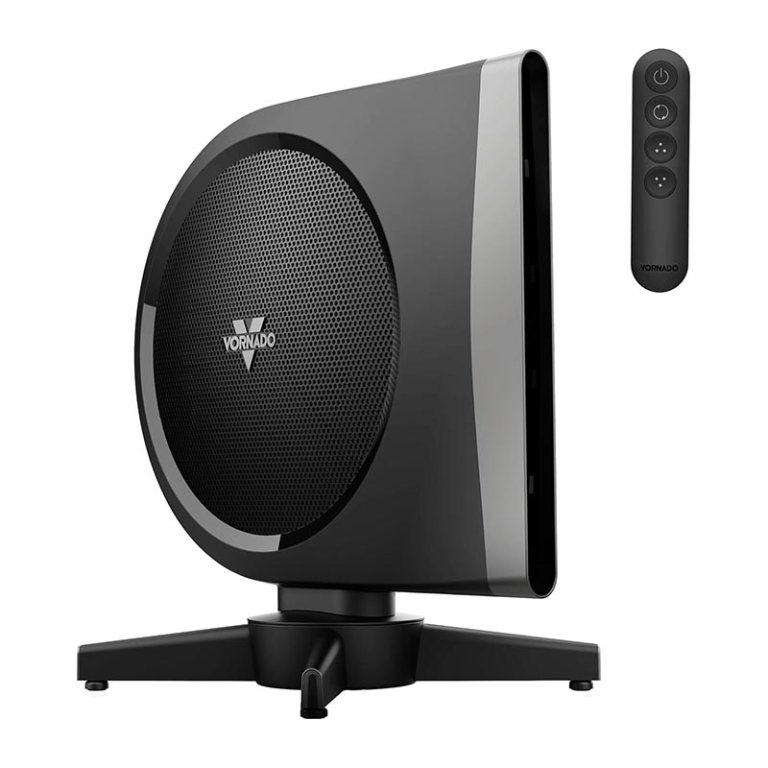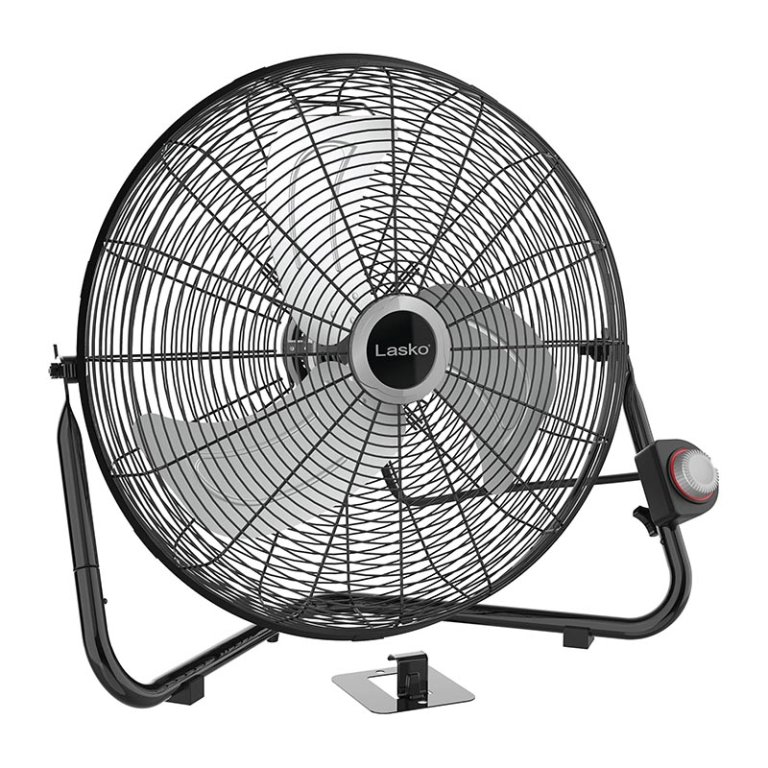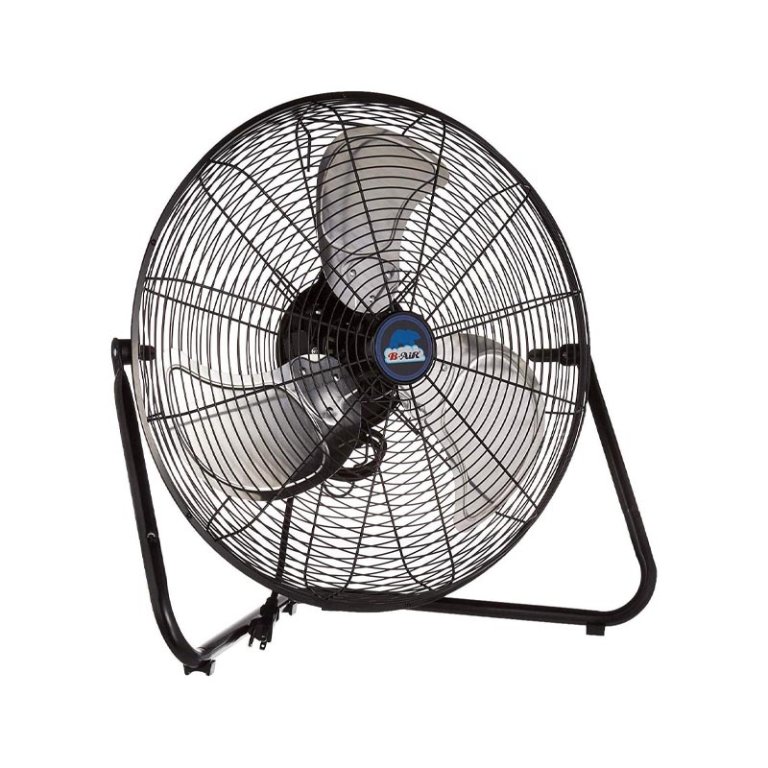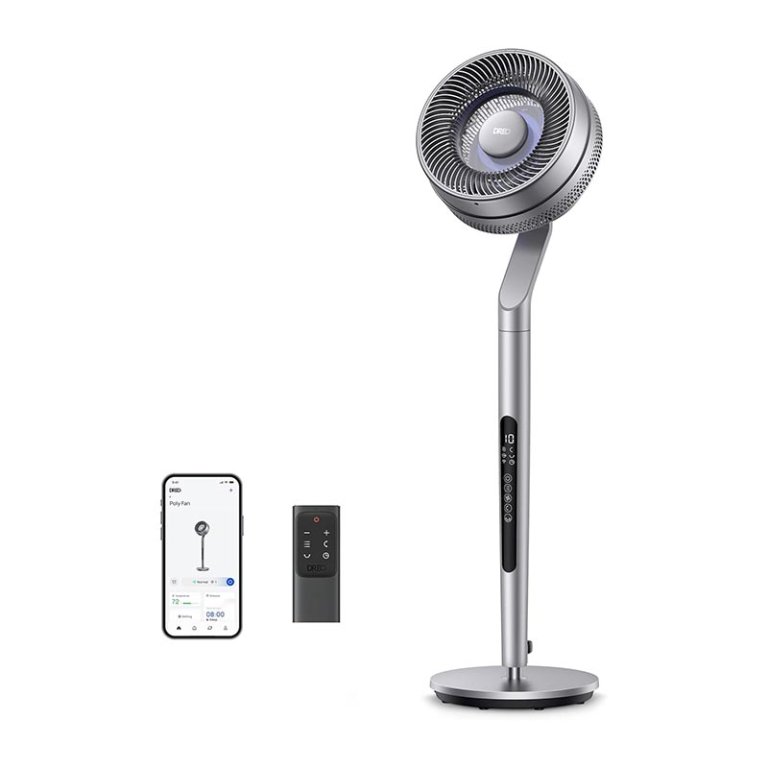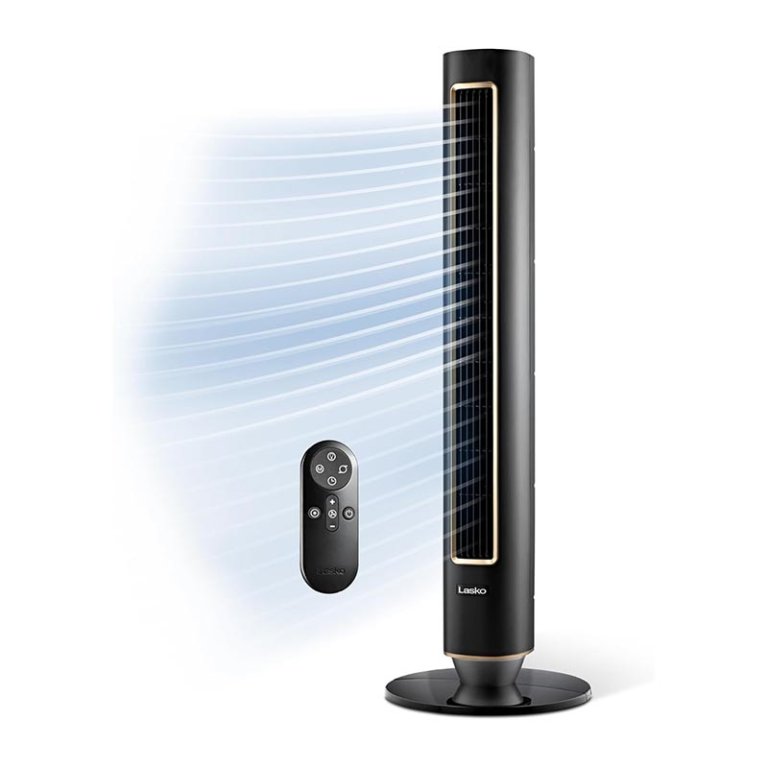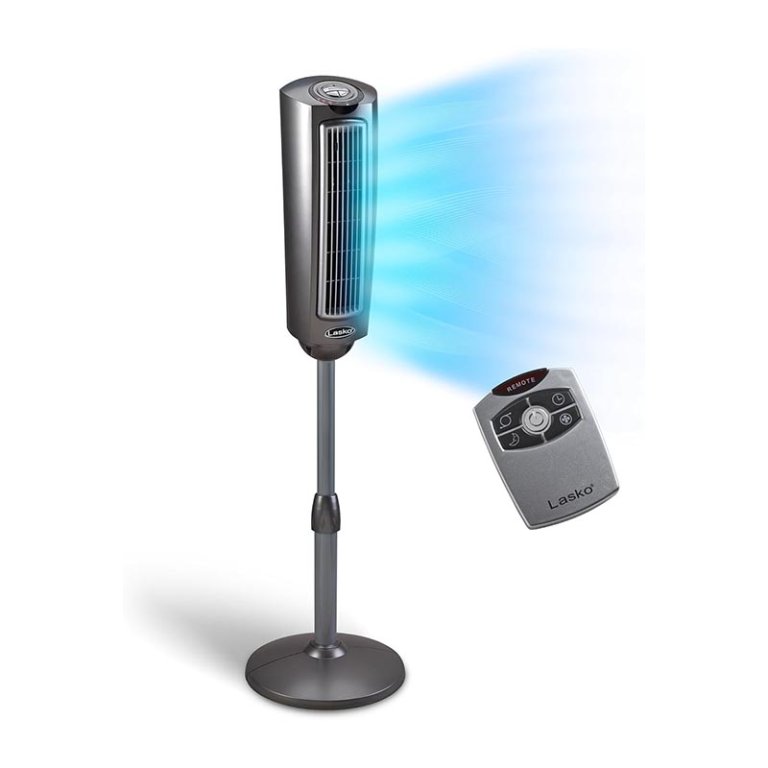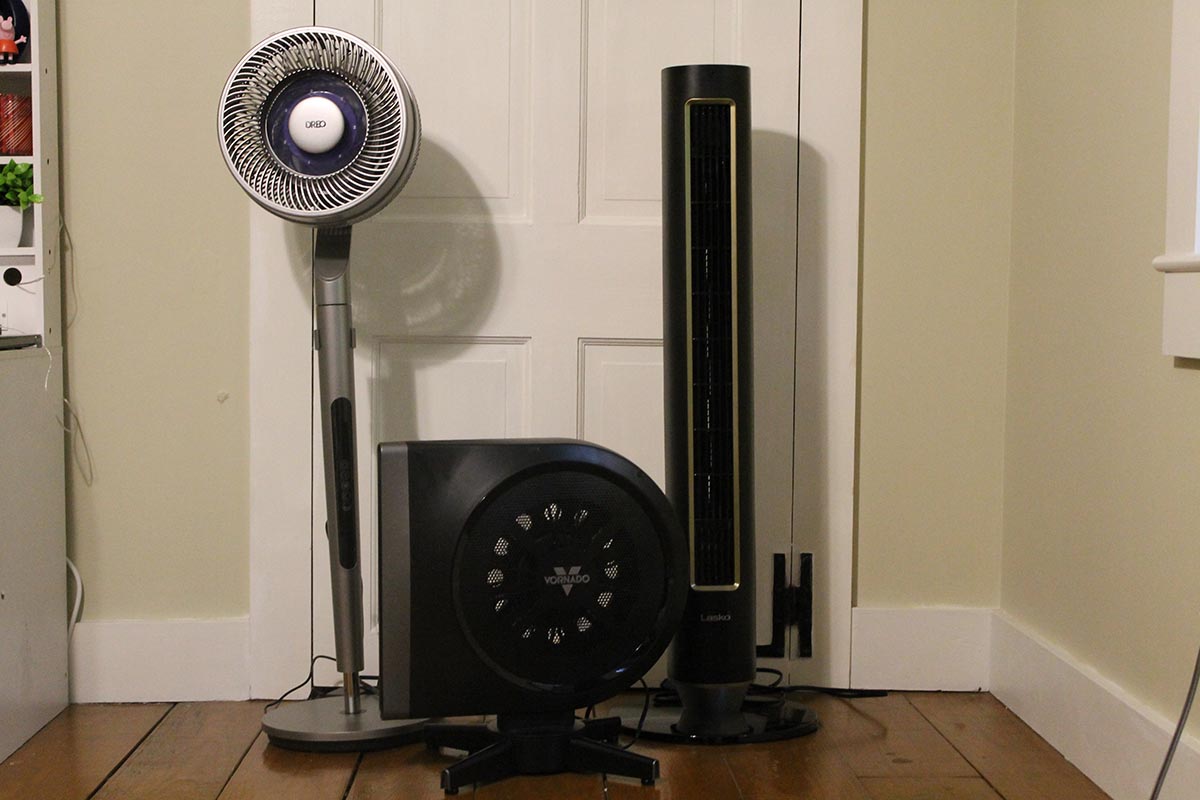
We may earn revenue from the products available on this page and participate in affiliate programs. Learn More ›
Powerful yet lightweight and versatile, floor fans offer a cost-effective alternative to blasting the AC when the weather is warm, helping save on energy bills. But not all floor fans provide enough cooling power to make a difference in a room’s comfort levels, so we tested 13 popular models to find the best ones out there.
Floor fans are available in several designs: traditional square-shaped box fans (which can often fit in windows as well as sit on the floor), high-velocity round air circulators, and tower fans. They may come with various features, such as multiple speed settings, an adjustable tilt for directed air circulation, and rubberized feet to protect hardwoods and other surfaces. All this means that there’s a lot to consider before choosing the right floor fan for your home.
After two months of testing, our top pick is the Vornado Strata Compact Oscillating Tower Fan. It pulls in cool air near the ground and disperses it through the room for powerful and efficient cooling. Six other models also fared well in our hands-on tests. Use this guide for important shopping considerations and recommendations on some of the best floor fans available.
- BEST OVERALL: Vornado Strata Compact Oscillating Tower Fan
↓ Jump to Review - RUNNER-UP: Lasko 20-Inch High-Velocity QuickMount Floor Fan
↓ Jump to Review - BEST BANG FOR THE BUCK: B-Air Firtana-20X High Velocity Electric Floor Fan
↓ Jump to Review - BEST PORTABLE: Air King 9212 12-Inch Industrial Grade Pivoting Fan
↓ Jump to Review - BEST SMART FAN: Dreo 715S TurboPoly Fan
↓ Jump to Review - BEST WITH FILTER: Lasko Pinnacle DST100 40-Inch Tower Fan
↓ Jump to Review - ALSO CONSIDER: Lasko 2535 52-Inch Oscillating Pedestal Fan
↓ Jump to Review
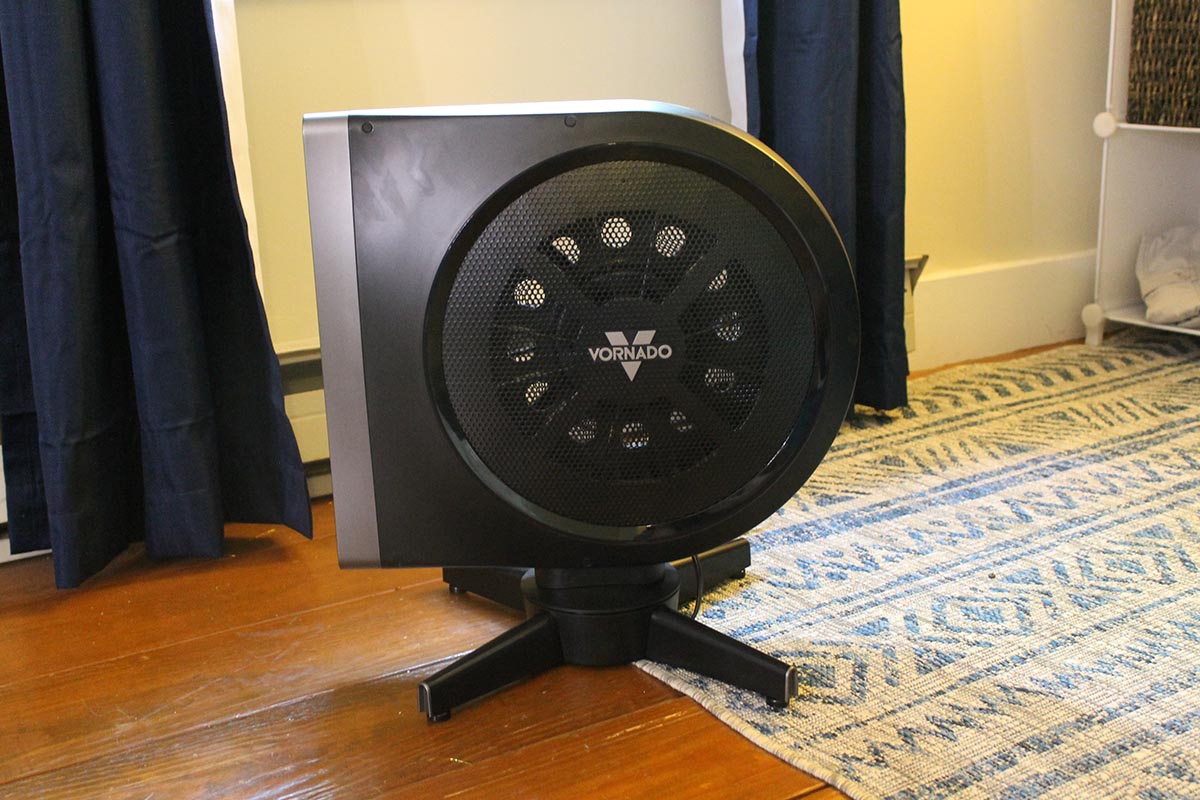
Floor Fans Comparison
| Product | Dimensions | Air Speed CFM | Speeds |
|---|---|---|---|
| Vornado Strata Compact Oscillating Tower Fan | 18.4 inches by 17.6 inches by 16.2 inches | 1741 | 5 |
| Lasko 20-Inch High-Velocity QuickMount Floor Fan | 22 inches by 22 inches by 12.6 inches | 2,785 | 3 |
| B-Air Firtana-20X High Velocity Electric Floor Fan | 24 inches by 22.3 inches by 6 inches | 4,650 | 3 |
| Air King 9212 12-Inch Industrial Grade Pivoting Fan | 16.5 inches by 15.5 inches by 8.5 inches | 1,010 to 1,360 | 3 |
| Dreo 715S TurboPoly Fan | 41.2 inches by 11 inches by 11 inches | Not listed | 10 |
| Lasko Pinnacle DST100 40-Inch Tower Fan | 40 inches by 5.6 inches by 5.6 inches | 450 | 12 |
| Lasko 2535 52-Inch Oscillating Pedestal Fan | 52.8 inches by 14 inches by 14 inches | Not listed | 3 |
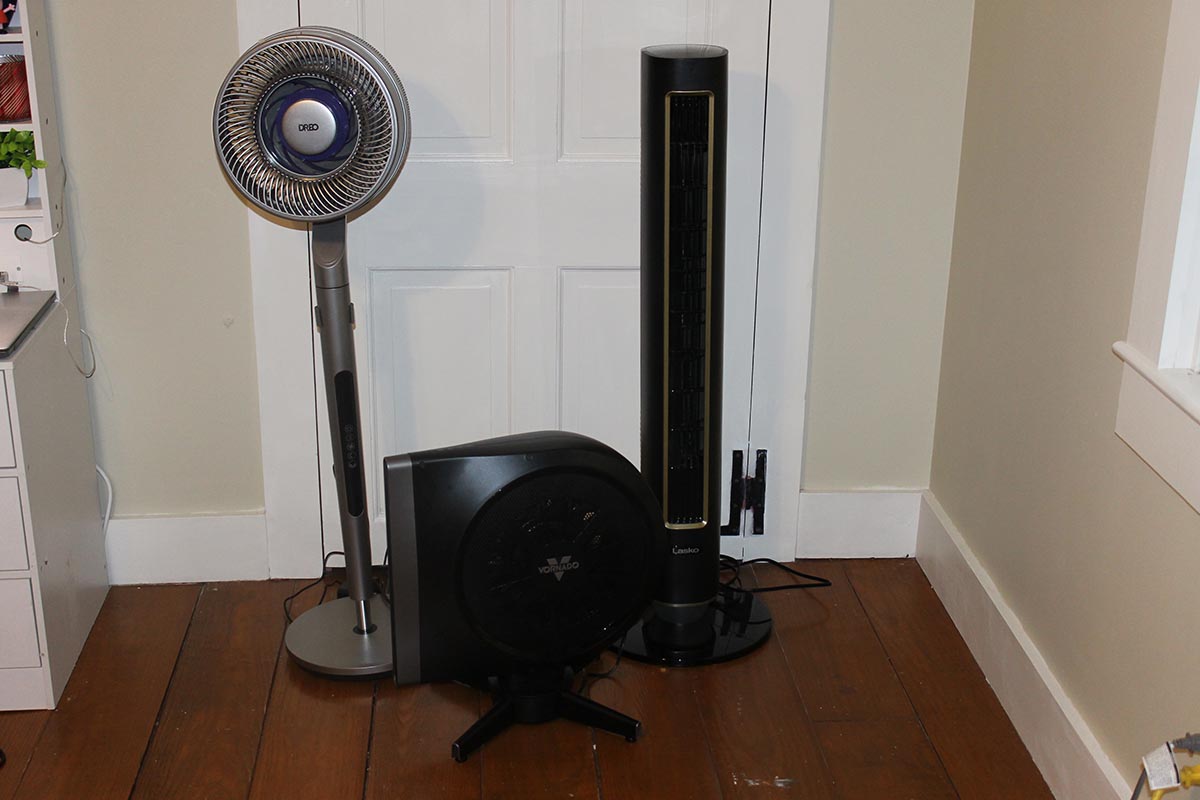
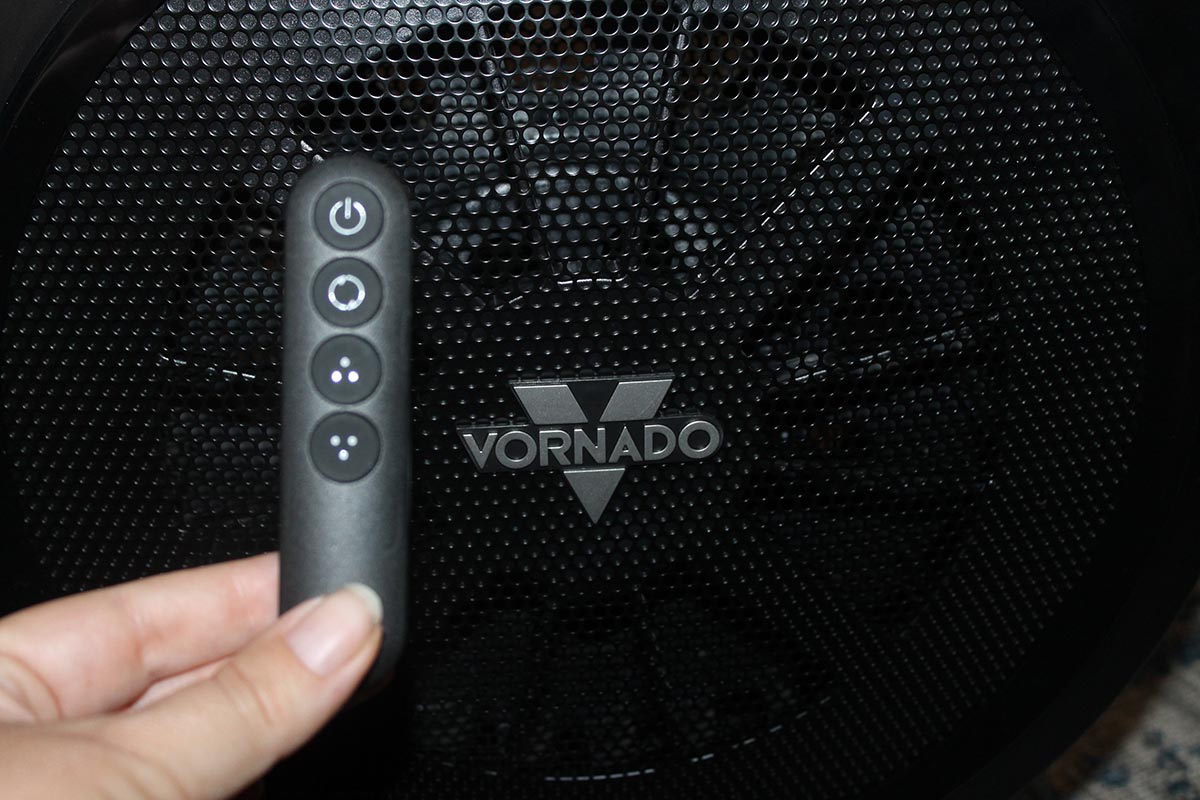
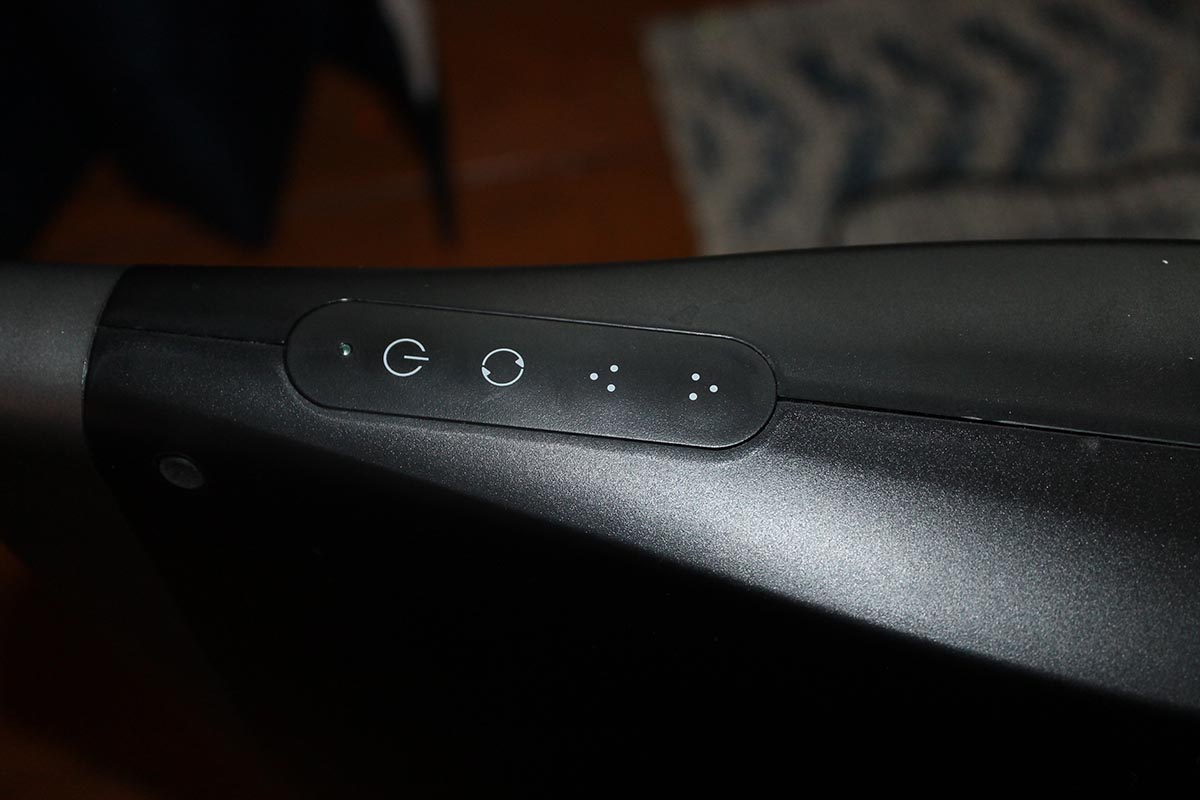
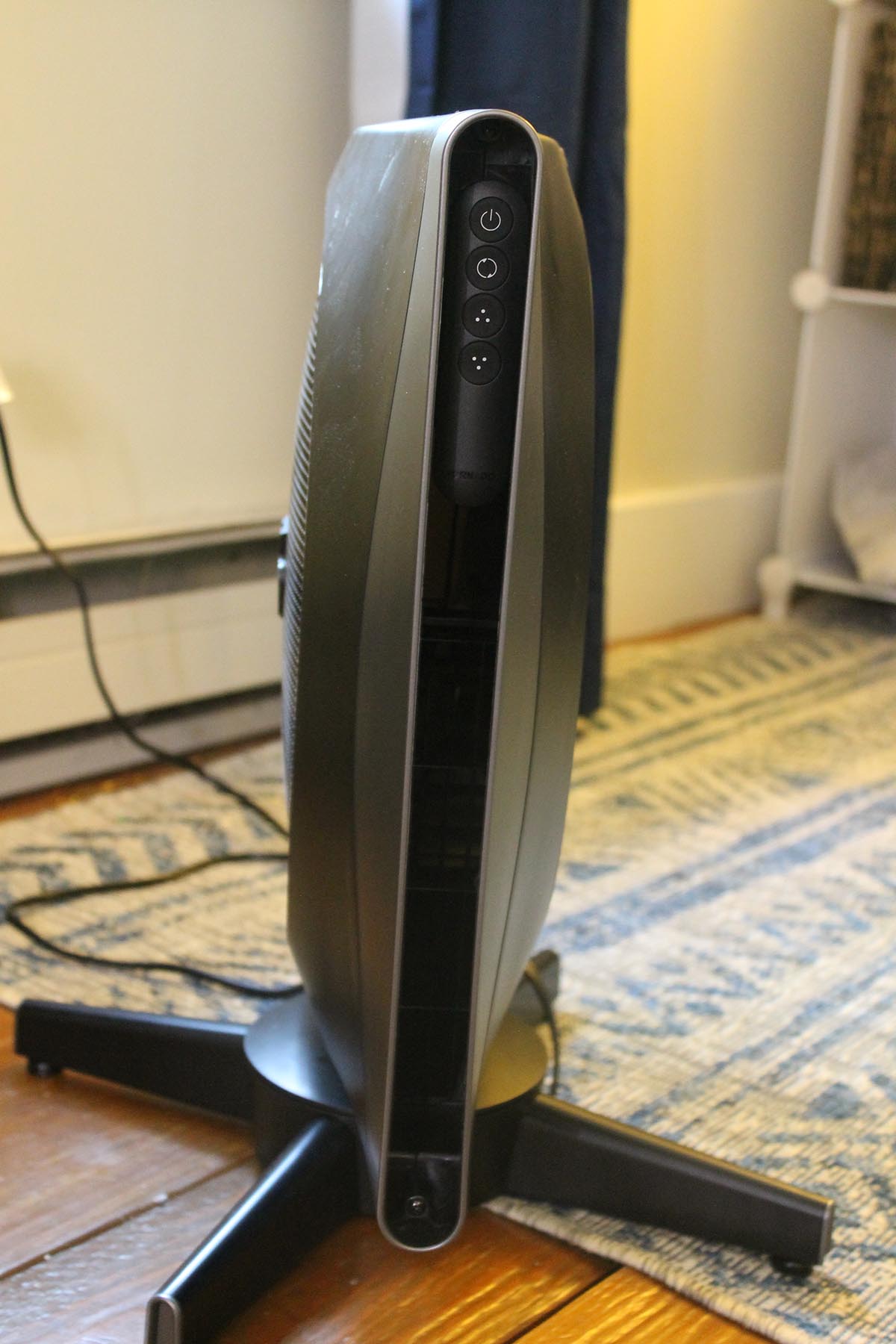
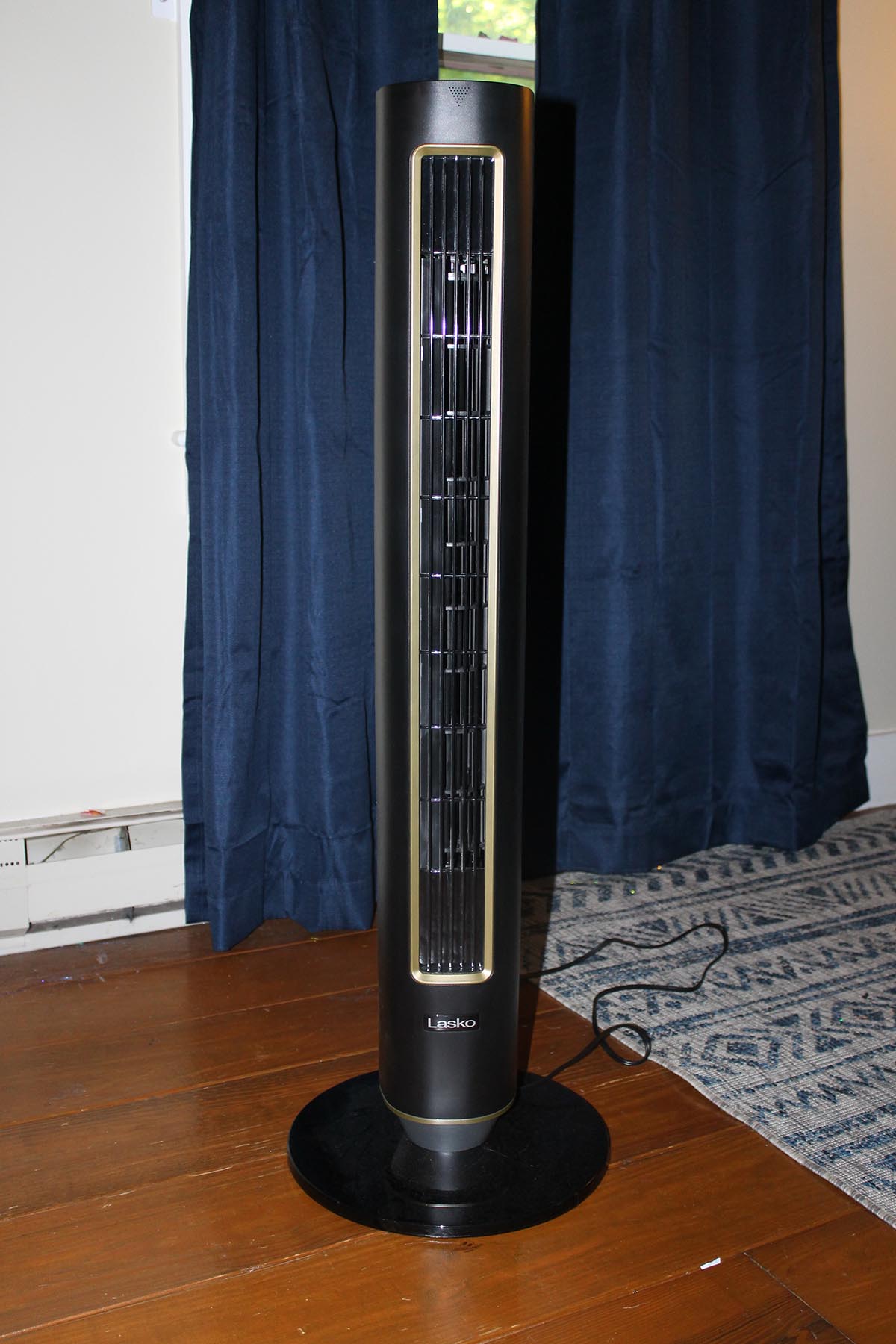
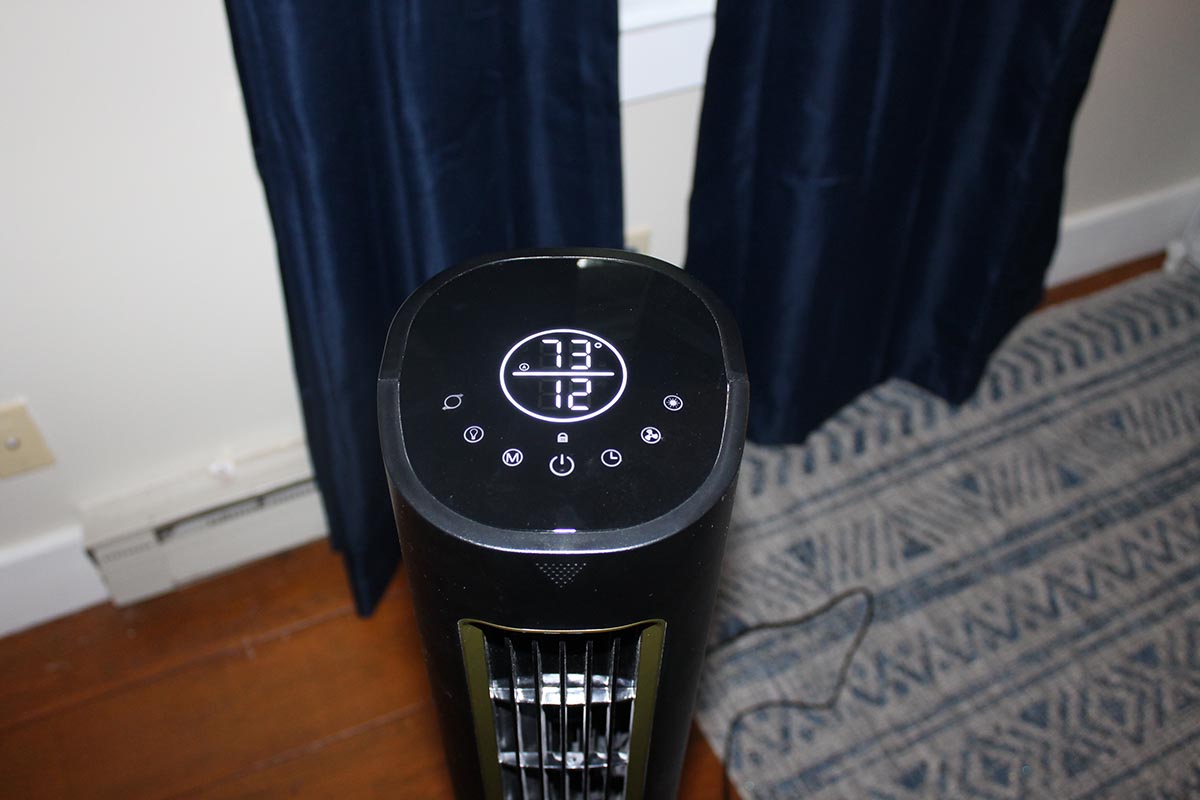
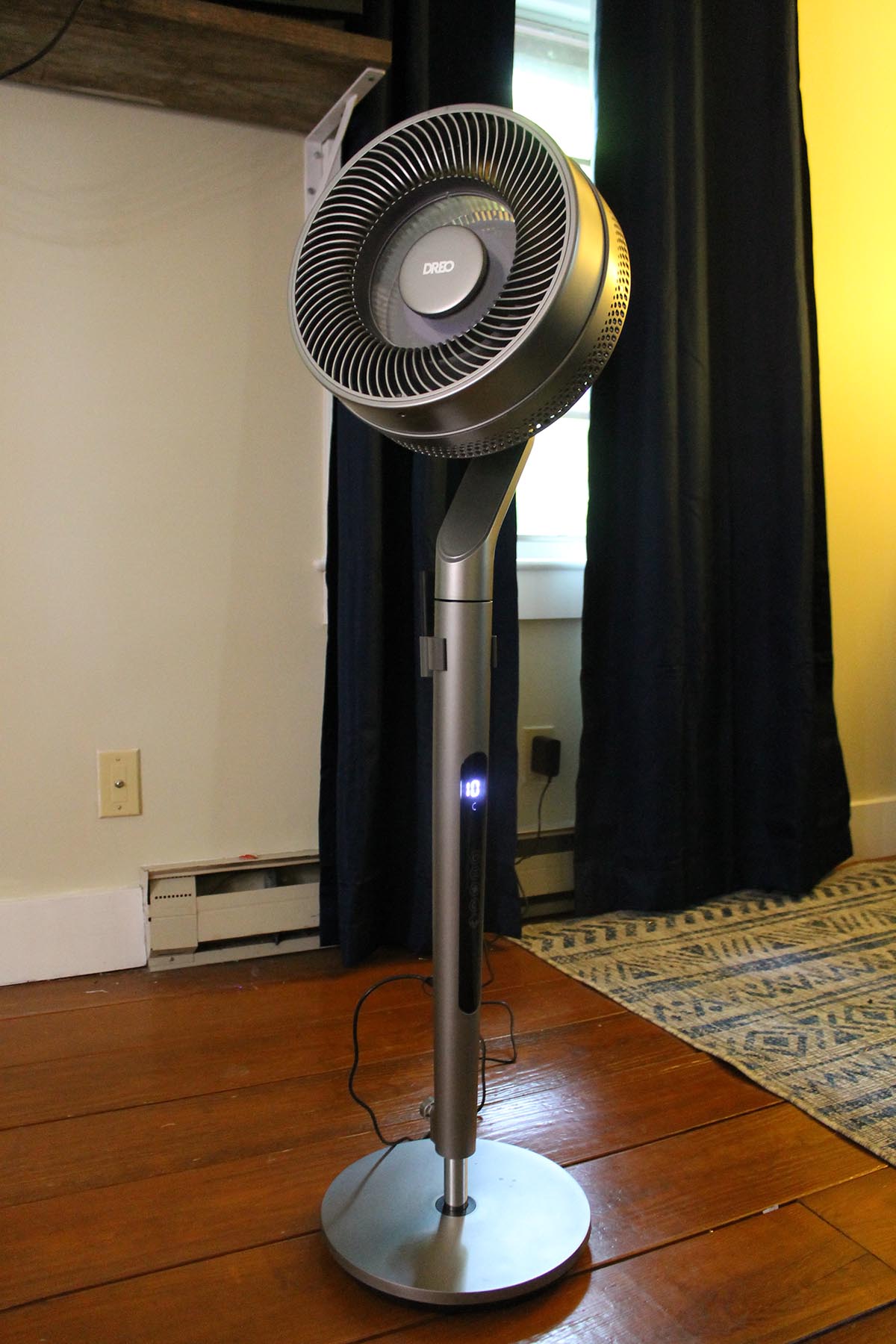
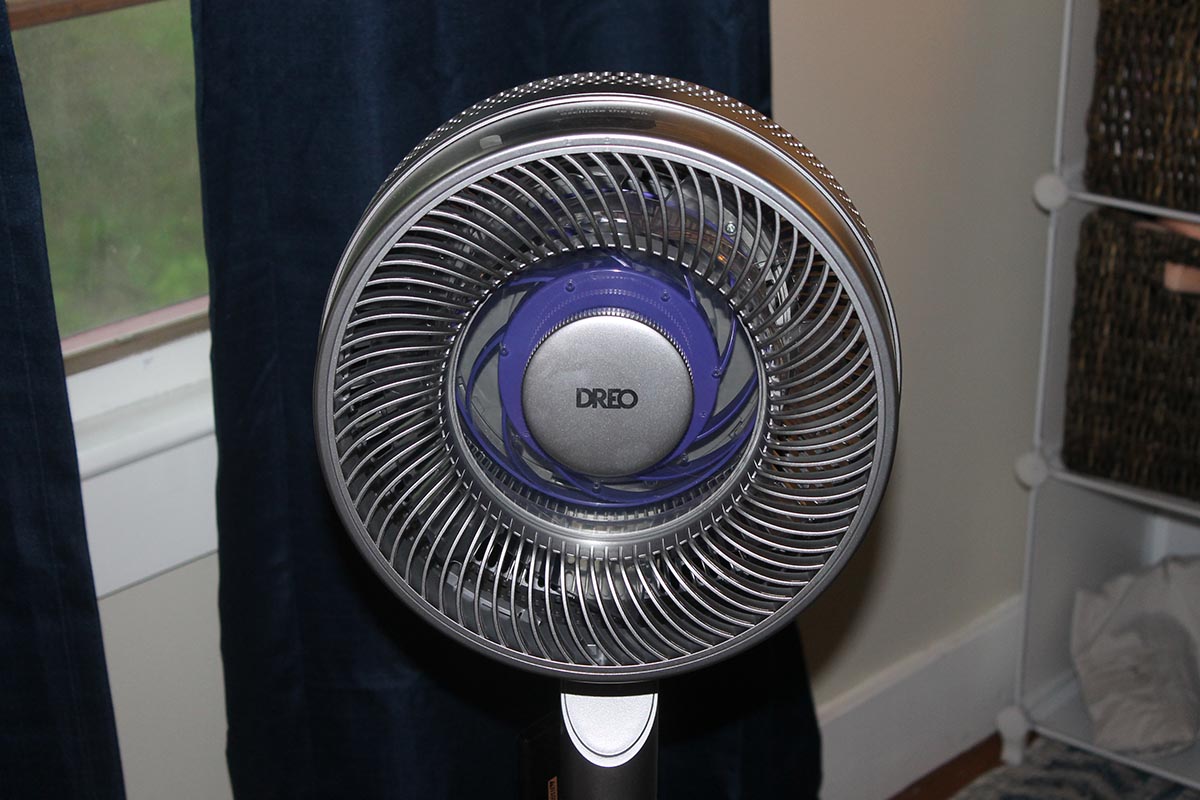
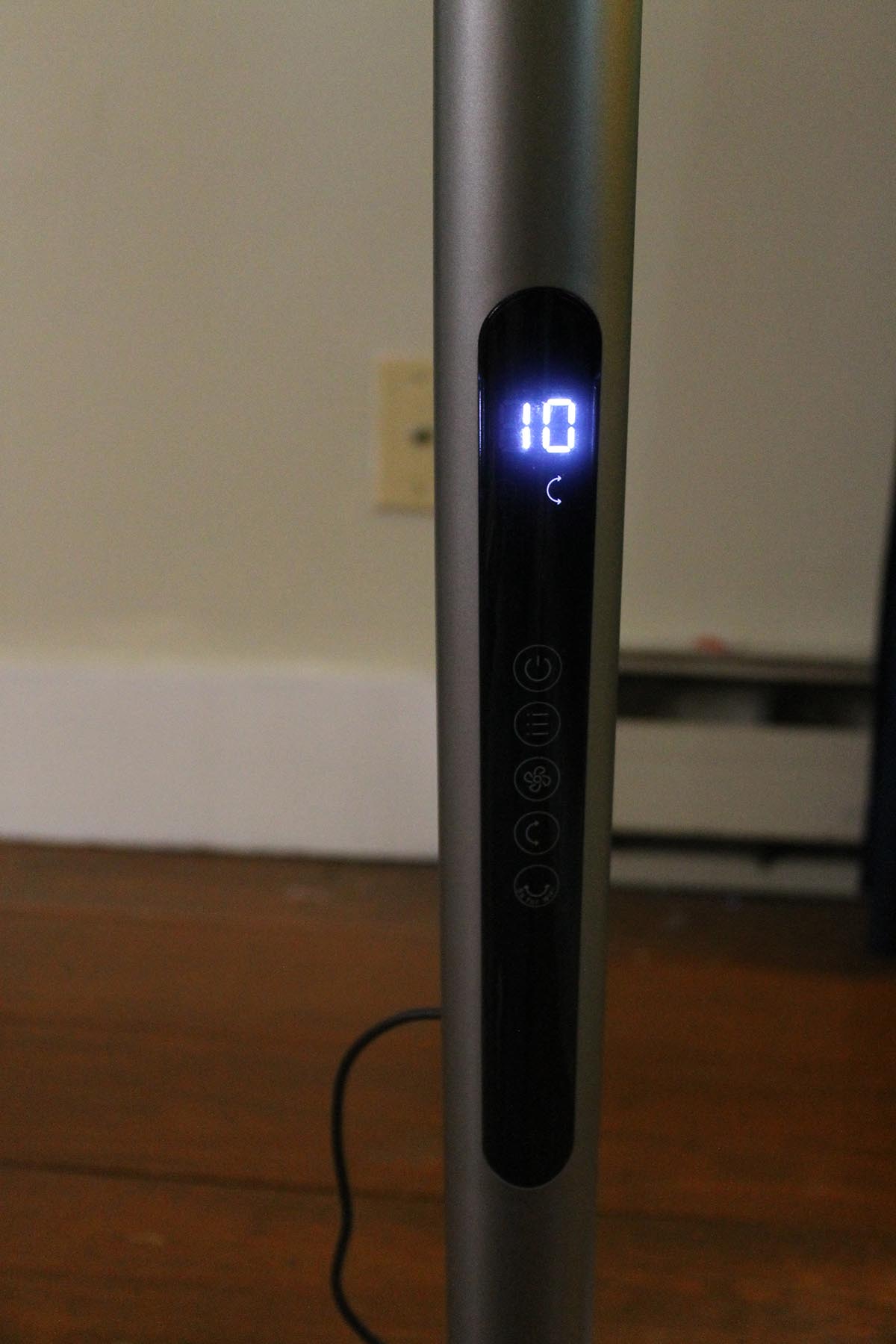
Our Top Picks
Each of the floor fans recommended below has its own set of unique features and specs, including cooling power, speed settings, and noise levels. Consider one of these high-performing units, all of which we tested and deemed worthy.
Best Overall
Vornado Strata Compact Oscillating Tower Fan
What We Like
- Harvests cool air near the ground for efficiency
- 180-degree oscillation disperses air across large rooms
- Includes built-in control panel and remote
- Compact size doesn’t take up much space
What We Don’t Like
- Can’t be disassembled to clean the fan blades
Specs
- Dimensions: 18.4 inches by 17.6 inches by 16.2 inches
- Air speed CFM: 1741
- Speeds: 5
Our Ratings: Assembly 5/5; Performance 4.5/5; Noise 4.5/5; Design 3.5/5; Value 4.7/5
The Vornado Strata uses Airlyft Airflow technology to pull in the coolest air near the ground and lift it upward, dispersing it throughout the room. We tested it in our large living room, and it did a great job keeping the space cool—even though the space is 23 feet long. When we placed the fan on full power and sat near it, it felt downright chilly (a testament to its cooling power), but when we put it on the opposite side of the room, it did exactly what we wanted: It circulated the cool air across the space. While it’s not whisper-quiet on its highest setting, it was still quiet enough for us to carry on conversations and watch TV.
The fan is simple to operate via the included remote or built-in touch panel. It has five speed settings and 90- and 180-degree oscillation. It also has onboard magnetic remote storage, helping to ensure that the remote doesn’t get lost when not in use.
The Vornado Strata doesn’t look like a typical fan—it’s enclosed on both sides and blows air from the front of the unit. It’s compact, packing in a lot of power without taking up too much space. The biggest downside is that users can’t disassemble it to clean the fan blades. Instead, the manufacturer recommends vacuuming dust from the tower using a vacuum brush attachment.
For those who are looking for these features but need a taller option, we also tested the 43.5-inch-tall Vornado 6803DC, and it passed our tests with flying colors. Read more in our Vornado pedestal fan review.
What our tester says: “The Vornado Strata is a simple fan that delivers some serious cooling power. I love that it’s compact enough to fit in the corner of my living room without looking like a huge eyesore, but still powerful enough to make a real difference in the room’s comfort levels.”—Katie Barton, Product Reviews tester and writer
Get the Vornado floor fan at Amazon, The Home Depot, Wayfair, Target, or Best Buy.
Runner-up
Lasko 20-Inch High-Velocity QuickMount Floor Fan
What We Like
- Lightweight and easily portable
- Powerful even on the lowest setting
- Front-facing controls for easy adjusting
- Base is stable
What We Don’t Like
- Quite a noisy fan
Specs
- Dimensions: 22 inches high by 22 inches wide by 12.6 inches deep
- Air speed CFM: 2,785
- Speeds: 3
Our Ratings: Assembly 5/5; Performance 4.5/5; Noise 2.5/5; Design 4/5; Value 5/5
This high-velocity floor fan boasts a powerful motor, durable steel construction, and metal blades. Powered by electricity from a standard 110 volt (110V) outlet, this fan is powerful enough for use in a large garage or a workshop. At the same time, thanks to its sleek design, it’s attractive enough to use in living spaces.
The front-facing manual control dial proved particularly convenient, since we were able to adjust the speed without moving the fan when it was placed in a corner or against a wall. Built-in rubber pads on the bottom of the fan protect hardwood floors and other surfaces. The rubber pads also added stability when the fan sat on the cement flooring of our shop. We liked the design of the pivoting head, which is adjustable to control the airflow up, down, and in between for more targeted ventilation.
The Lasko weighs a manageable 15 pounds and includes a convenient carrying handle, so it’s easy to move around the house or shop. This model comes with instructions and hardware that can convert it to a wall-mounted fan with the included bracket. Unfortunately, this isn’t the quietest fan we tested. The noise decibel level isn’t listed in the manual, but it’s loud enough that people conversing will have to speak more loudly than normal to be heard over it. On the other hand, for those who enjoy a bit of white noise, this is a great high-power fan for bedroom use.
What our tester says: “I tested the Lasko 20-inch fan in a shop to see how well it circulated the air in a large room. I ran each of the speed settings (low, medium, and high), and even on the low setting, it circulated air very well.”—Stacey L. Nash, Product Reviews tester and writer
Get the Lasko 20-inch floor fan at Amazon or The Home Depot.
Best Bang for the Buck
B-Air Firtana-20X Electric Floor Fan
What We Like
- Thick, industrial-grade cord
- Powerful on the higher settings
- Convenient carrying handle
What We Don’t Like
- Loud on the highest setting
Specs
- Dimensions: 24 inches high by 22.3 inches wide by 6 inches deep
- Air speed CFM: 4,650
- Speeds: 3
Our Ratings: Assembly 5/5; Performance 4.5/5; Noise 2.5/5; Design 4/5; Value 4.7/5
Boasting a medium-high air speed of 4,650 CFM, The B-Air Firtana-20X is a solid option for midsize rooms. The 5-foot cord offers plenty of versatility to situate the fan wherever it’s most needed. That cord is also thick and industrial, likely to withstand heavy use.
The 360-degree rotation was particularly helpful in our workshop, since we could adjust the fan to suit the nature of various projects. Some projects needed ventilation low to the ground, while for other projects, the angle was able to be directed at the user.
The all-metal housing comes apart for cleaning, which we found fairly easy to do. The B-Air only weighs 11 pounds, and its sturdy handle makes transporting it even easier.
Get the B-Air floor fan at Amazon.
Best Portable
Air King 12-Inch Industrial Grade Pivoting Fan
What We Like
- Thick, industrial-strength cord
- Feels more powerful than specs suggest
- Small, compact, and easy to carry
What We Don’t Like
- Loud on the highest speed setting
Specs
- Dimensions: 16.5 inches high by 15.5 inches wide by 8.5 inches deep
- Air speed CFM: 1,010 to 1,360
- Speeds: 3
Our Ratings: Assembly 5/5; Performance 4.5/5; Noise 4/5; Design 4/5; Value 4.7/5
Those in the market for a portable fan might want to consider this Air King model, which strikes a good balance between being compact while still providing ample power. The powder-coated blades are only 12 inches, and the whole unit measures 15.5 inches by 8.5 inches by 16.5 inches, so it has a small footprint that fits easily into a small room.
It also has sufficient power to keep the space cool, with CFM of air speeds from 1,010 (low) to 1,170 (medium) to 1,360 (high). In testing, we found it capable of cooling larger spaces, too, making this a versatile, portable fan.
This air circulator fan plugs into a regular household 120V outlet, and its thick and heavy cord should stand up to heavy use. Do note that the Air King is fairly loud. While it was on the highest setting, we had to dial our conversation volume up a notch to be heard.
Get the Air King floor fan on Amazon or Lowe’s.
Best Smart Fan
Dreo 715S TurboPoly Fan
What We Like
- Compatible with smart devices and voice commands
- Features vertical and horizontal oscillation, plus 10 speeds
- Includes remote and built-in control panel
- Attractive adjustable-height design
What We Don’t Like
- Heavy; difficult to carry from room to room
- Pricier than the average pedestal fan
Specs
- Dimensions: 41.2 inches high by 11 inches wide by 11 inches deep
- Air speed CFM: Not listed
- Speeds: 10
Our Ratings: Assembly 4/5; Performance 5/5; Noise 4/5; Design 4/5; Value 4.7/5
Those who value aesthetics as much as function will appreciate the design and power of the Dreo 715S floor fan with remote. With 10 speeds, 6 wind modes, and omnidirectional oscillation, the Dreo delivers ample cooling power with sleek style. It is Wi-Fi–compatible and can be controlled through a smart device, but it also includes a remote and a built-in touch panel for easy control.
After unboxing the Dreo fan, we assembled it by attaching the base. Surprisingly, the base was very heavy, so we had to grab an extra set of hands to secure it. We then spent over a month using this fan in our bedroom every night. Its height is adjustable from 40 to 44 inches, and it features vertical and horizontal oscillation settings, which made it easy to position the fan right where we needed it most.
This fan runs relatively quietly. At its lowest speeds, it was so quiet that we didn’t even notice it. On its highest speed, it generated just the right amount of white noise to fall asleep to without being disruptive. It’s also incredibly easy to clean. Simply remove one screw to detach and wash the grille cover and fan blades in the sink.
Overall, this fan was one of our favorites among those we tested. Our only complaint is the weight. Unfortunately, it’s not an easily portable oscillating fan—it’s heavy and cumbersome to carry from room to room.
Get the Dreo floor fan at Amazon.
Best with Filter
Lasko Pinnacle DST100 40-Inch Tower Fan
What We Like
- Includes a Carbon X air filter
- Features a digital touch screen control panel
- Comes with remote and has onboard remote storage
- Features AirSense intelligent control
What We Don’t Like
- Some report having issues with the remote
Specs
- Dimensions: 40 inches high by 5.6 inches wide by 5.6 inches deep
- Air speed CFM: 450
- Speeds: 12
Our Ratings: Assembly 5/5; Performance 4/5; Noise 4.5/5; Design 4/5; Value 4/5
Those looking for a fan chock full of features should look no further than the Lasko Pinnacle 40-Inch Tower Fan. It features 12 speeds, 4 modes, 90-degree oscillation, and a built-in night light. It also comes with a Carbon X filter capable of removing contaminants from the air and neutralizing odors.
We tested this oscillating fan in a bedroom for more than a month. On its lowest settings, it was whisper quiet, and on its highest setting, it provided gentle white noise that helped us fall asleep. The fan has four modes: custom, natural, night, and auto. Custom mode allows the user to select the fan speed, natural mode mimics natural wind, night mode shuts off the display and gradually decreases the fan speed, and auto mode adapts the fan speed to the ambient air temperature in the room. The fan also has a timer and a screen snooze button to shut off the digital display.
While we tested all modes, we mostly used custom mode to select the speed we preferred. The night light was a big hit, and makes this fan a great option for kids’ rooms or bedrooms where a soft glow is welcome. The one complaint we have is regarding the remote. Two buttons on the remote only seemed to work for us about half of the time (oscillation and night light). Fortunately, when this occurred, we could still control the fan from its built-in touch panel.
Get the Lasko Pinnacle floor fan at Amazon or Walmart.
Also Consider
Lasko 2535 52-Inch Oscillating Pedestal Fan
What We Like
- Small footprint with excellent height options
- Quiet fan for bedroom use
- Adjustable height and louvers
- Remote control included
What We Don’t Like
- Controls may be difficult to use at full fan height
Specs
- Dimensions: 52.8 inches high by 14 inches wide by 14 inches deep
- Air speed CFM: Not listed
- Speeds: 3
Our Ratings: Assembly 5/5; Performance 4/5; Noise 4/5; Design 3/5; Value 4.7/5
The Lasko pedestal fan has a stable but compact base that doesn’t eat up much square footage. The fan itself has an elongated head to move the maximum amount of air with a minimum of horizontal space, and the stand adjusts in height. These design features add up to a solid product that performed well in testing.
This standing fan moves air well and can remain static or oscillate. Louvers also allow users to adjust the direction of the airflow. All of the Lasko’s speed settings were quiet, but the dedicated quiet setting was nearly undetectable. It’s a fan that can run in the background without disrupting conversations.
The fan has a built-in timer that can run for 0.5, 1, 2, or 4 hours, but the onboard controls are on the top of the fan, which isn’t the most convenient location. When the fan is at its full height, shorter individuals may find it difficult to see the controls. Fortunately, a handy remote control is included.
Get the Lasko 2535 pedestal fan at Amazon or Walmart
Jump to Our Top Picks
How We Tested the Best Floor Fans
| Testing Stats | |
|---|---|
| Products tested | 13 |
| Time spent testing | 2 months |
| Tests performed | 6 |
| Price range | $70 to $200 |
These floor fans were tested in a residential workshop used for welding, woodworking, metal work, and general home maintenance projects. They were left running for a similar length of time, and all speed settings and features were tested. For additional tests, we brought the fans inside and used them where we saw fit, like in the living room or bedrooms.
We evaluated how effective each fan was at circulating air at various settings, and we also kept noise levels at all settings in mind. We evaluated noise levels by judging how easy it was to hold conversations and listen to music while the fans were operating nearby.
Any added features, such as timers, nighttime settings, and tilt/oscillation, were also taken into account. To evaluate portability, we carried the fans approximately 35 yards in two directions: from a house to the shop where they were tested and back again.
The floor fans received a score between 1 and 5 for each of the test areas, including assembly, cooling at low and high speeds, noise levels at low and high speeds, portability, and design.
| Product | Assembly | Performance | Noise | Design | Value |
| Vornado Strata Compact Oscillating Tower Fan | 5/5 | 4.5/5 | 4.5/5 | 3.5/5 | 4.7/5 |
| Lasko 20-Inch High-Velocity QuickMount Floor Fan | 5/5 | 4.5/5 | 2.5/5 | 4/5 | 5/5 |
| B-Air Firtana-20X High Velocity Electric Floor Fan | 5/5 | 4.5/5 | 2.5/5 | 4/5 | 4.7/5 |
| Air King 9212 12-Inch Industrial Grade Pivoting Fan | 5/5 | 4.5/5 | 4/5 | 4/5 | 4.7/5 |
| Dreo 715S TurboPoly Fan | 4/5 | 5/5 | 4/5 | 4/5 | 4.7/5 |
| Lasko Pinnacle DST100 40-Inch Tower Fan | 5/5 | 4/5 | 4.5/5 | 4/5 | 4/5 |
| Lasko 2535 52-Inch Oscillating Pedestal Fan | 5/5 | 4/5 | 4/5 | 3/5 | 4.7/5 |
What to Consider When Choosing the Best Floor Fan
Floor fans are available with a range of features and benefits specific to each model. When shopping for a floor fan, consider the room’s size and how you plan to use the fan. That will help narrow the choices based on size, design, cooling power, oscillation, speed settings, controls, and noise levels.
Size
Floor fans’ dimensions vary. The diameter of the fan blades typically measures anywhere from 12 to 24 inches, with 20 inches considered average. A fan’s size and features are among the variables that contribute to its weight. The average 20-inch floor fan weighs approximately 10 to 15 pounds, which makes it easy to move. Small, personal floor fans can weigh as little as 2 pounds, while larger industrial outdoor fans can weigh 30 pounds or more.
Cooling Power
A fan’s cooling power is measured by cubic feet per minute (CFM). This value measures how much air a fan moves every minute. CFM varies by model based on the construction, size, motor, and blades. Fans with high CFM move air more quickly than fans with low CFM, which is why a high CFM value is recommended for larger areas (great rooms, greenhouses, garages) that require more air movement. While CFM is a great way to get an idea of a fan’s power and compare it to other models, not every manufacturer includes this information in the product description, packaging, or the owner’s manual.
Oscillation
Unlike standard box fans that blow in one direction, the blades of oscillating fans are housed in a case that rotates from side to side to provide broader air circulation. Typical oscillation settings offer 180-degree rotation for optimal air coverage. Some models have blades that rotate a full 360 degrees. There are also fans with the ability to pivot the hub up and down to direct air where it’s most needed. Some floor fans allow users to switch from standard to oscillation mode with the click of a button.
Speed Settings
Many floor fans have multiple settings—typically low, medium, and high—so users can select the ideal speed for each situation. Generally, low offers a light breeze while high speed quickly circulates the air for a stronger breeze. Switching between different speeds is most often done with a turn of a rotary dial found on the front or the back of the fan, although some models also have built-in digital control panels or remote controllers.
Noise Level
Fans require motors and blades to operate, which usually generate some degree of noise, but certain models are quieter than others. When shopping for a quiet fan, check the decibel (dB) levels, which are listed in the product information of some (but not all) floor fans. Normal conversation is about 60 dB, office noise is about 70 dB, the sound from a vacuum cleaner is around 75 dB, and a noisy restaurant or power mower is approximately 80 dB. Smaller, personal fans are almost always quieter than larger industrial floor fans.
Remote Control and Additional Features
Many of today’s floor fans for home use are equipped with remote controls, allowing users to change the airflow settings without accessing them directly on the device. Remotes may also have automatic shut-off timer functions.
Beyond basic speed and oscillation, some fans offer advanced modes. These may include auto mode, which adjusts fan speed based on room temperature; sleep mode, which lowers noise levels for nighttime use; and natural mode, designed to mimic outdoor breezes.
Other features to consider include built-in filters, night lights, extra-long power cords, timers, adjustable heights, and smart capabilities for control via smartphone or voice assistant apps.
FAQs
Though you now understand many qualities and considerations of floor fans, you still may want more information. Below are answers to some of the most common questions about these types of fans.
A floor fan stands or rests on the floor, though some are designed with the ability to mount them on a wall. It has rotating blades powered by electricity from a standard outlet (or sometimes from a battery).
Rather than directing the fan at people, place the floor fan so that it faces the wall opposite where most activity takes place. This allows cool air to bounce off the wall and out into the rest of the room without creating a direct breeze that can scatter paper or irritate eyes or skin. Ensure that no large objects are blocking its pathway, so the air spreads out further and maximizes the fan’s effectiveness.
Floor fans sit low to the ground and are generally used to generate air circulation and ventilation in medium to large spaces. Pedestal fans and tower fans are a subtype of floor fans that are typically used for air circulation and cooling in smaller spaces because they take up less square footage due to their tall and narrow design. Rather than circulating the air from the ground up, they move the air that is higher up in the room and direct the air more forcefully into specific areas. They also tend to be quieter and less powerful than floor fans.
It’s generally okay to leave a floor fan running all the time. The biggest issues in doing so are increased energy consumption and wear to the fan.
Floor fans don’t use much electricity, especially when compared to air conditioners or even whole-house fans. The amount of electricity fans use will vary by brand and model, as well as the setting selected on the fan.
Bladeless fans run more quietly and are safer than their traditional bladed counterparts. However, they may not circulate air as powerfully, and they’re usually more expensive.
Clean floor fans about once per month or whenever dust builds on the grille cover or blades.
Katie Barton is a writer and product tester with over a decade of experience in the field. She relies on window AC units and fans to cool her home, giving her firsthand experience in what makes a floor fan worth the investment.
Additional Research provided by Stacey L. Nash and Erica Reagle.
